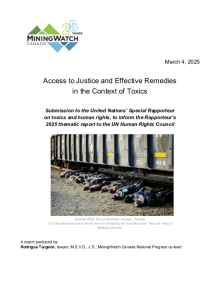Important victory for citizens: CPTAQ denies Canada Carbon project for a graphite mine
Grenville-sur-la-Rouge - Following a mobilization that began in 2017, the citizens of Grenville-sur-la-Rouge have achieved a significant victory against the junior mining exploration company, Canada Carbon. On March 18, 2025, the Quebec Agricultural Land Protection Commission (CPTAQ or Commission) issued a decision rejecting the graphite mine development project.
